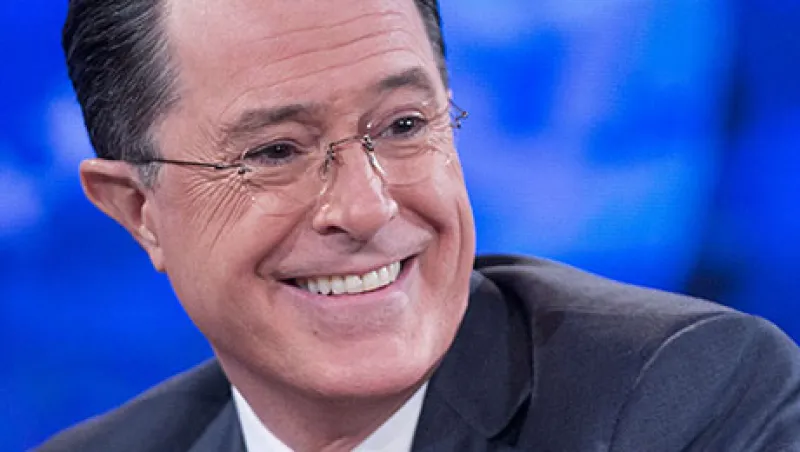Late-night talk shows have long been a forum for celebrities, sports stars and activists to plug their projects and grab a few headlines. For the small price of enduring a host’s playful jabs and sometimes awkward questions, the guests get face time with just the audience they want to reach — one that in the early days of Johnny Carson would talk about them around the water cooler the next day and today might tweet about them immediately. Now that Stephen Colbert has taken over from David Letterman as host of the Late Show on CBS, that coveted guest seat may be more appealing to a group that has largely avoided it, whether by choice or by lack of invitation: CEOs.
Last night, during the second episode of Colbert’s new show, he hosted Elon Musk, founder of space travel and exploration firm SpaceX and electric car maker Tesla Motors and chairman of solar power provider SolarCity. Colbert introduced Musk as “the real Tony Stark,” referring to Marvel’s Iron Man character, who is also a billionaire scientist and inventor, and the two discussed whether Musk is a “superhero” or “supervillain.” Musk seemed a bit uncomfortable in the guest seat, but he took the opportunity to emphasize his confidence in humans’ ability to live on Mars one day soon.
“[Mars is] a fixer-upper of a planet,” Musk said, to audience laughter, before describing how we could use either thermonuclear weapons or greenhouse gases to warm the planet and make it fit for human inhabitants. The topic was a little wonky for late-night TV, and Musk didn’t play along with all of Colbert’s jokes, but the host discussed his own personal experience with his Tesla and seemed to ask the right questions to get Musk talking about his newest products and endeavors. Tonight, Uber CEO Travis Kalanick — a name many users of the ride-sharing service likely don’t even know — will have the same opportunity.
“I wouldn’t be surprised if [Amazon.com CEO] Jeff Bezos is [invited] there,” says Paul Levinson, who teaches media and communications at Fordham University and has written several books about new media.
Colbert has a mandate to be somewhat hipper than Letterman to keep his existing audience and potentially steal some away from competitors, says Levinson. One obvious way to do that, he adds, is to choose guests who are “disrupters” and major players on the cutting edge of the digital revolution.
“We live in a new age of social media in which TV as a medium is less important, and I think what Colbert is going to try to do is get people on the show who point to this new kind of world that we live in — pathbreaking people,” Levinson says. “The question is, how he’s going to integrate that in a way that’s funny. Obviously, Elon Musk is not a comedian.”
Musk did make one joke during his short interview with Colbert Wednesday night: an off-color comment about a new automatic recharging arm for the Tesla. But for the most part, the conversation was more educational than funny.
The tendency toward headier subjects is Colbert’s biggest strength and is what will keep him competitive against late-night rivals Jimmy Kimmel, Jimmy Fallon and James Corden, according to Robert Thompson, a professor of TV and popular culture at Syracuse University’s Newhouse School. It reflects both Colbert’s personal style — which viewers of the first couple of episodes have noticed has a lot in common with the fictional anchorman he played for ten seasons on The Colbert Report — and the interests and status of the demographics he hopes to reach. People found Colbert funny because they were either already plugged in to the news and trends of the day or because they wanted to be.
Colbert Report viewers were largely in the Millennial bracket, often criticized in editorials for not caring about anything other than iPhones, but that group is arguably most ready for the next phase of the technological revolution — if they’re not out creating it themselves. Whatever the detractors say, it’s those people whom business leaders like Musk and Kalanick want to reach. Doing so through TV before Tuesday was somewhat difficult: Most talk shows are focused on celebrities and would pass on someone like Kalanick, unless he had another major public scandal or put out a YouTube video that went viral — and the shows’ tenor has been unappealing to many in the business world.
Musk did an extended interview with Jon Stewart on the Daily Show in 2012, but it would be unheard of to see someone like Bezos, as Levinson suggested, on a late-night couch. Thanks to a confluence of Colbert’s personality, interests and audience, and tech business leaders’ acknowledgment of the need for more direct communication with the investors and customers they seek, that dynamic may be changing.
Get more on technology.
Follow Kaitlin Ugolik on Twitter at @kaitlinugolik.






